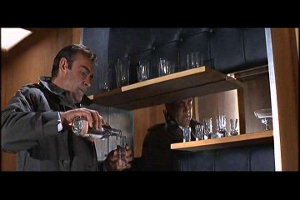
And now we get to talk about Sequelitis. You’d expect the fifth Bond movie to bear some resemblance to its predecessors, but You Only Live Twice can’t seem to help calling attention to its heritage. Personally, I blame Roald Dahl. He should’ve turned this project down from the start. He and Ian Fleming were apparently good friends in real life, but their writing styles couldn’t be further from each other if you placed them on opposites sides of the cosmos. Dahl hated the novel that shares this film’s title and, twenty-one years after the film premiered, flat-out admitted to Starlog magazine “I didn’t know what the hell Bond was going to do.” Producers Albert Broccoli and Harry Saltzman answered by giving him The Formula, whole and (more or less) complete by 1966, at the latest.
As Dahl defined The Formula would go on to define this series:
“Bond has three women through the film: If I remember rightly, the first gets killed, the second gets killed and the third gets a fond embrace during the closing sequence. And that’s the formula. They found it’s cast-iron. So, you have to kill two of them off after he has screwed them a few times. And there is great emphasis on funny gadgets and love-making.”
With this information, the author of Charlie and the Chocolate Factory became the author what is essentially Dr. No 2: In Japan. You can tell how many people actually bother to read Dahl’s work by whether or not they call this film “silly.” Sorry, Charlie, but compared to The Chocolate Factory (published the same year as this film’s eponymous novel) and especially compared to The Glass Elevator, this is Roald Dahl phoning it in after he’s taken a fist-full of horse tranquilizers. And he still managed to create one of the most influential films of the series, large portions of which have become fertile ground for parody, satire and knowing reference. So I come not to bury this fifth Bond film, but to lament what could have been…and argue that, as “silly” as things get in this picture, they could’ve stood to get a whole lot “sillier.” There might be more to recommend. Continue reading You Only Live Twice (1967)
